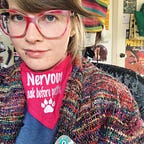Are our CVs sites of gender-based sterotyping?
Note: This article was previously published at Feminartsy’s now-defunct journal.
Language is inevitably gender-coded. It is, after all, “man-made”. We cultivate our own gender expression through language, and infer gender from the vernacular of others. While this occurs in every facet of our social existence, employment is an area where language can be hugely influential to our prospects.
Many people experience gender as an intrinsic aspect of their identity, so it is not necessarily detrimental that people use language that they feel comfortably expresses their individual voice. However, these voices are subject to the prejudices, assumptions and experiences of their audience.
Just as there are entire industries that are seen as predominantly masculine or feminine, our communication styles are similarly categorised to establish and reinforce a status quo. Even to the point where we must re-gender words to undermine stereotypes or highlight social norms — “#girlboss” and “mansplaining” being good examples of this phenomenon.
As is often the case, masculine voices tend to be regarded as the neutral or default, while voices that reveal more femininity are seen as uniquely belonging to women and women-aligned people. Feminine voices are not seen as universally relevant, but rather as a niche interest. This is not unlike the classification of ‘women’s fiction’ — as if fiction is an otherwise masculine concept.
Blind applications, wherein the personal information of applicants is concealed during the evaluation process, are instituted by some companies in an attempt to level the playing field. While these have been found to increase the shortlisting of women and ethnic minorities, the implicit nature of gender-coding in language means that the bias often plays out subconsciously and without a second thought.
In the realm of employment, where neutrality is rewarded, this poses a dilemma. Do we accept our feminine-coded voices? Or do we edit ourselves in the hopes we can benefit from a masculine-skewed understanding of neutral language?
My name is unisex, so I have tried to use this ambiguity to my advantage. Unfortunately, this quite plainly means I have scoured through my CV and my cover letters to “man it up”. Whatever that means. I have edited and re-edited, chopped and changed, and stared at words until they lost their meanings — wondering if the phrase “helping others” somehow sounds revealing of my gender. These experiences always reminded me of a satire piece that left me at the painful mercy of Poe’s Law, where irony feels too real and reality is too ironic. I felt like a downtrodden Lady MacBeth, basically exclaiming “unsex me here” as I scrapped all semblance of my personality from my CV and tried to rid myself of enough femininity to reap the unencumbered potential of a hearty, masculine job application.
At least until the interview.
Unfortunately, most employers want to hire people who are like them. Better yet, employers want to hire people that they already know. Ultimately, I can anticipate and neutralise as many possible biases as I want, but even in the best-case scenario, I will be offered an interview where there’s nowhere left to hide. I would’ve just wasted a couple of hours de-gendering my application that I could’ve spent searching for companies that have updated their hiring policies (at least) since the turn of the millennium.
So, what can we do for employment while waiting out some companies (and old corporate crusties) to fade into obsolescence? What can we actually control?
When we scroll through job advertisements, we are inferring gender from them too. And often, we are judging ourselves based on those assumptions. Our feminine voices are often treated as a weakness, so when we come across a masculine-coded job description, we are quick to accept this as intentional or exclusionary.
Often, we deselect ourselves.
Words such as “leader” and “competitive” are masculine-coded to a point where women will be much less likely to apply for positions that use this type of vernacular in their descriptions. With fewer female applicants, the more likely the job will be offered to a man, and ultimately create a self-fulfilling prophecy.
Not only that, men tend to apply for jobs at a much lower threshold of relevant skills and qualifications. If a company’s description lists ten prerequisites, women seldom apply unless they meet almost all of them. Men tend to be a bit laxer — as do many employers, who often create these lists of job requirements to weed out clearly under-qualified applicants, but without as much stringency as we expect.
The way gender-coding shapes our interactions is a useful awareness to possess, but can also serve as a sharp tool of implicit bias. Until we have axed these inequitable systems altogether, the best we can do is to wield femininity as a strength, while applying for positions with a masculine gusto.
